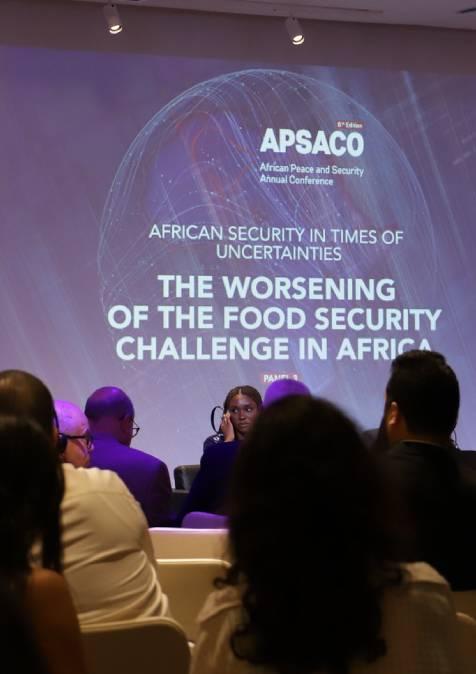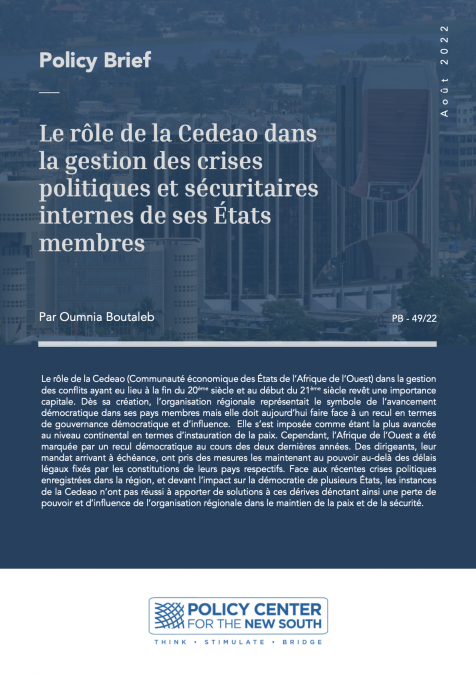As the African continent grapples with a new generation of complex and interconnected threats, ranging from violent extremism and transnational crime to governance-related tensions and climate-induced insecurity, Southern Africa is also called upon to reinforce its contribution to continental peace and security. While the region has traditionally maintained a strong reputation for stability, emerging challenges are testing the limits of existing mechanisms and requiring renewed political engagement. This conversation will explore the strategic role of Southern African leadership in shaping and operationalizing the African Peace and Security Architecture (APSA). It will examine how SADC, alongside national governments, can further align with APSA’s core pillars, early warning, preventive diplomacy, peace support operations, and post-conflict reconstruction, while upholding the principles of subsidiarity and regional ownership. Special attention will be given to how diplomacy, cooperation, and institutional coordination can help translate commitments into concrete impact on the ground.
Speakers
RELATED CONTENT
-
AuthorsAugust 11, 2022Le rôle de la Cedeao (Communauté économique des États de l’Afrique de l’Ouest) dans la gestion des conflits ayant eu lieu à la fin du 20ème siècle et au début du 21ème siècle revêt une importance capitale. Dès sa création, l’organisation régionale représentait le symbole de l’avancement démocratique dans ses pays membres mais elle doit aujourd’hui faire face à un recul en termes de gouvernance démocratique et d’influence. Elle s’est imposée comme étant la plus av ...
-
 AuthorsAugust 3, 2022The timing was perfect for analyzing the “African Security in times of uncertainties”. The Rabat-based “Policy Center For The New South” programmed its 6th “African Peace d Security Annual Conference” (APSACO) on July 20/21 to focus on the historic challenge of our time-the world, Africa in particular, struggling to find stability while war s waged in Central Europe, and 25 million tons of wheat and fertilizers needed to feed the starving population, millions on the Afri ...
AuthorsAugust 3, 2022The timing was perfect for analyzing the “African Security in times of uncertainties”. The Rabat-based “Policy Center For The New South” programmed its 6th “African Peace d Security Annual Conference” (APSACO) on July 20/21 to focus on the historic challenge of our time-the world, Africa in particular, struggling to find stability while war s waged in Central Europe, and 25 million tons of wheat and fertilizers needed to feed the starving population, millions on the Afri ... -
Helmut Sorge, Rama YadeJuly 22, 2022L'ancienne secrétaire d'État chargée des Affaires étrangères et des Droits de l'homme, Rama Yade, met le point sur la position de l’Europe face aux difficultés de l’Afrique en temps d’inc ...
-
July 21, 2022كانت سنة 2021 سنة اضطراب جيو-سياسي وانقلاب جيو-اقتصادي عالميين. ومع تزايد زخم الأحداث، دخل العالم فترة تحول جيو-سياسي وجيو-اقتصادي تعلن نهاية دورة تاريخية وتُنبِّؤ بآفاق غير مؤكدة لدورة جديدة. وعليه، فإننا من الآن فصاعداً أمام تغير عالمي حقيقي ينطوي على نقاط ضغط متعددة وقوىً دافعة جيو-س...
-
July 21, 2022L'année 2021 a été le théâtre de perturbations géopolitiques et de troubles géoéconomiques à l'échelle mondiale. À mesure que les événements s'accélèrent, nous entrons dans une période de transition géopolitique et géoéconomique ; la fin d'un cycle historique laissant présager les persp...
-
July 21, 20222021 was a year of global geopolitical disruption and geo-economic upheaval. As events gather momentum, the world enters a period of geopolitical and geo-economic transition; the end of one historical cycle foreshadowing the uncertain prospects of a new one. We are henceforth, in presen...
-
July 20, 20222021 was a year of global geopolitical disruption and geo-economic upheaval. As events gather momentum, the world enters a period of geopolitical and geo-economic transition; the end of one historical cycle foreshadowing the uncertain prospects of a new one. We are henceforth, in presen...
-
July 20, 2022كانت سنة 2021 سنة اضطراب جيو-سياسي وانقلاب جيو-اقتصادي عالميين. ومع تزايد زخم الأحداث، دخل العالم فترة تحول جيو-سياسي وجيو-اقتصادي تعلن نهاية دورة تاريخية وتُنبِّؤ بآفاق غير مؤكدة لدورة جديدة. وعليه، فإننا من الآن فصاعداً أمام تغير عالمي حقيقي ينطوي على نقاط ضغط متعددة وقوىً دافعة جيو-س...
-
July 20, 2022L'année 2021 a été le théâtre de perturbations géopolitiques et de troubles géoéconomiques à l'échelle mondiale. À mesure que les événements s'accélèrent, nous entrons dans une période de transition géopolitique et géoéconomique ; la fin d'un cycle historique laissant présager les persp...
-
AuthorsJuly 19, 2022Les missions militaires de l’Union européenne (UE) en Afrique revêtent aujourd’hui, à l’heure de la réinvention du partenariat euro-africain, une importance considérable. Alors que Bruxelles entend plus que jamais s’imposer comme l’un des garants de la sécurité au niveau mondial, tout en se mesurant aux nouveaux rapports de force mondiaux, elle tient parallèlement à devenir un acteur incontournable en matière de paix, de surcroît motivé par la prolifération des risques ...





